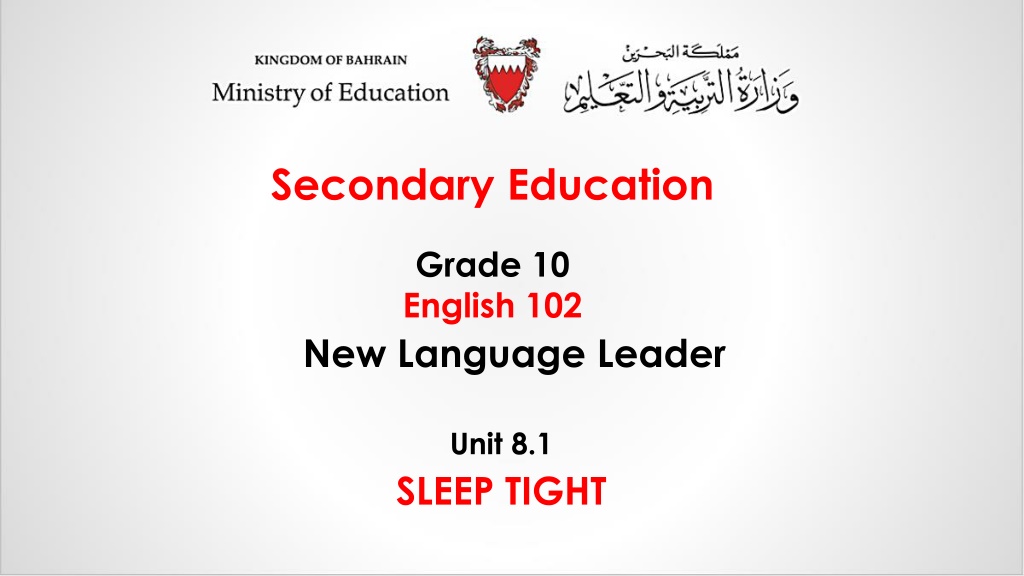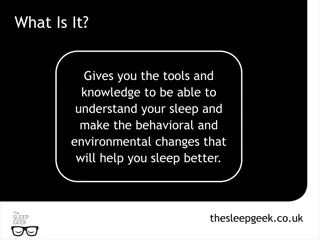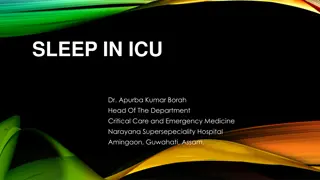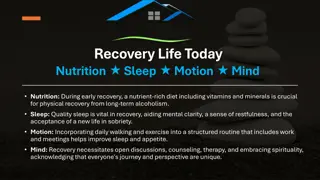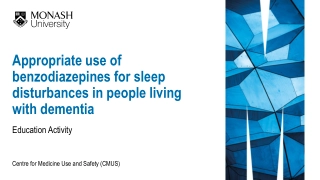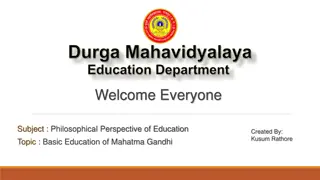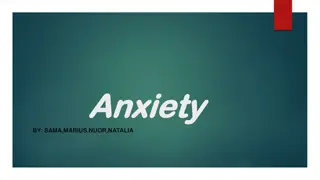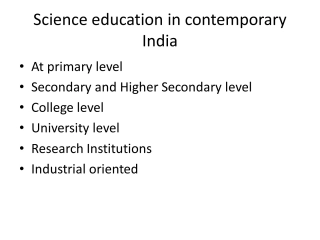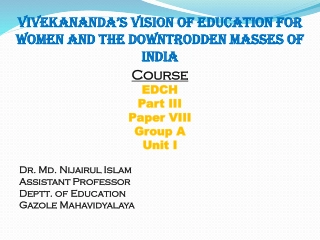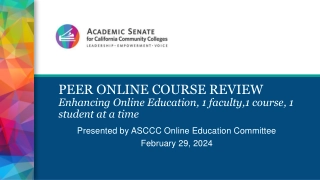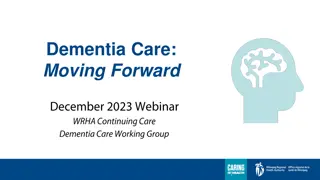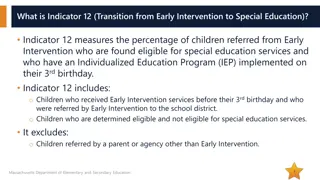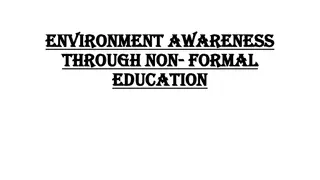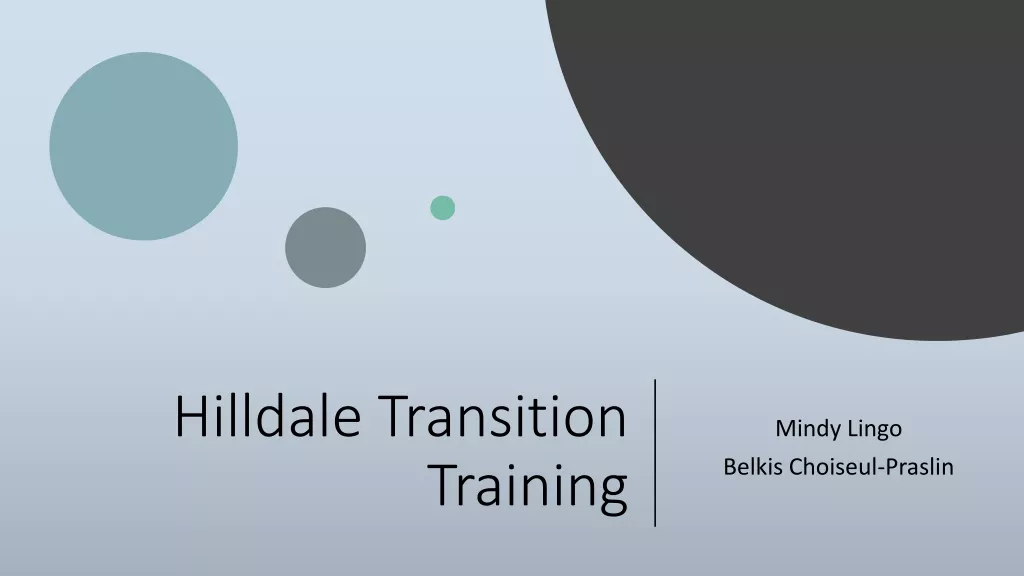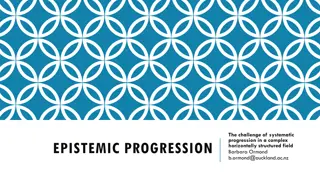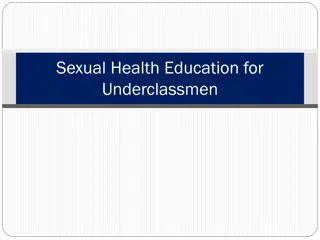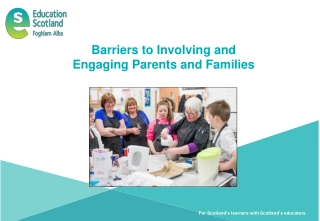Exploring the Importance of Sleep in Education
In this lesson from Secondary Education Grade 10 English, students delve into the significance of sleep, revise sleep-related vocabulary, and practice different verb patterns. They engage in a quiz to test their knowledge about sleep duration in various age groups and explore why sleep is essential for all living beings. Through interactive activities and discussions, learners deepen their understanding of the benefits of adequate sleep and factors influencing sleep duration across different age brackets.
Download Presentation
Please find below an Image/Link to download the presentation.
The content on the website is provided AS IS for your information and personal use only. It may not be sold, licensed, or shared on other websites without obtaining consent from the author. Download presentation by click this link. If you encounter any issues during the download, it is possible that the publisher has removed the file from their server.
Presentation Transcript
Secondary Education Grade 10 English 102 New Language Leader Unit 8.1 SLEEP TIGHT
Eng. 102 Unit 8 / Lesson 1 SLEEP NIGHT OBJECTIVES By the end of the lesson, students will be able to: learn more about sleep and its importance. Revise vocabulary connected with sleep. revise and practise the patterns verb + infinitive and verb + ing. learn the pattern verb + preposition + ing.
Before we start Before we start Let s check your knowledge about sleep! Let s check your knowledge about sleep! Read the following statements about sleep and say whether they are True or False. STATEMENTS TRUE FALSE Most kids between the ages of 5 and 12 need 10 to 11 hours of sleep each night. Kids need less sleep than grownups do. Too little sleep can make you more able to think clearly and follow directions. Cats get an average of 6 hours every day. A lion gets as much as 20 hours of sleep per day. MINISTRY OF EDUCATION 2020 2021 Eng. 102 Unit 8 / Lesson 1 SLEEP NIGHT
Before we start Before we start Let s check your knowledge about sleep! Let s check your knowledge about sleep! Read the following statements about sleep and say whether they are True or False. STATEMENTS TRUE FALSE Most kids between the ages of 5 and 12 need 10 to 11 hours of sleep each night. Kids need less sleep than grownups do. (They need more sleep that grownups do. Adults can get by on about 7 hours a day.) Too little sleep can make you more able to think clearly and follow directions. (Too little sleep can make you less able to think clearly and follow directions.) Cats get an average of 6 hours every day. (Cats love to curl up and sleep. They get an average of 16 hours every day.) A lion gets as much as 20 hours of sleep per day. Eng. 102 Unit 8 / Lesson 1 SLEEP NIGHT MINISTRY OF EDUCATION 2020 2021 Eng. 102 Unit 8 / Lesson 1 SLEEP NIGHT
Why Do I Need to Sleep? Read the text and answer the following questions. 1- Why do all living beings need to sleep? ----------------------------------------------------------------------------------------------------------------------------------------------------------------- 2- What are the benefits of sleep? (Mention 3 benefits) A- ------------------------------------------------------------------------------------------------------------------------------------------------------------- B- ------------------------------------------------------------------------------------------------------------------------------------------------------------- C- ------------------------------------------------------------------------------------------------------------------------------------------------------------- 3- On what factor does the amount of sleep we need depend? ----------------------------------------------------------------------------------------------------------------------------------------------------------------- 4- How much time do babies sleep? ----------------------------------------------------------------------------------------------------------------------------------------------------------------- 5- How much time do older people need to sleep each night? ----------------------------------------------------------------------------------------------------------------------------------------------------------------- 6- How much time do 5 to 12-year-old kids need to sleep? ----------------------------------------------------------------------------------------------------------------------------------------------------------------- 7- What will happen to a person who misses two nights of sleep? ----------------------------------------------------------------------------------------------------------------------------------------------------------------- 8- What will happen to a person who misses five nights of sleep? ----------------------------------------------------------------------------------------------------------------------------------------------------------------- Eng. 102 Unit 8 / Lesson 1 SLEEP NIGHT MINISTRY OF EDUCATION 2020 2021 Eng. 102 Unit 8 / Lesson 1 SLEEP NIGHT
Why Do I Need to Sleep? Every creature needs to rest. Giraffes, little babies, elephants, dogs, cats, kids, koala bears, grandparents, moms, dads, and hippos in the jungle they all sleep! Just like eating, sleep is necessary for survival. Did you know: Skipping 1 night's sleep makes a person cranky and clumsy. After missing 2 nights of sleep, a person will have problems thinking and doing things; his or her brain and body can't do their normal tasks nearly as well. After 5 nights without sleep, a person will hallucinate (this means seeing things that aren't actually there). Eventually, it becomes impossible for the brain to give its directions to the rest of the body without sleep the brain needs to spend time in bed and catch its ZZZs! Sleep gives your body a rest and allows it to prepare for the next day. It's like giving your body a mini-vacation. Sleep also gives your brain a chance to sort things out. Scientists aren't exactly sure what kinds of organizing your brain does while you sleep, but they think that sleep might be the time when the brain sorts and stores information, replaces chemicals, and solves problems. The amount of sleep a person needs depends a lot on his or her age. Babies sleep a lot about 14 to 15 hours a day! But many older people only need about 7 or 8 hours of sleep each night. Most kids between the ages of 5 and 12 years old are somewhere in between, needing 10 to 11 hours of sleep. Some kids might need more and some need less. It depends on the kid. Eng. 102 Unit 8 / Lesson 1 SLEEP NIGHT MINISTRY OF EDUCATION 2020 2021 Eng. 102 Unit 8 / Lesson 1 SLEEP NIGHT
Why Do I Need to Sleep? SUGGESTED ANSWERS Read the text and answer the following questions. 1- Why do all living beings need to sleep? Sleep is necessary for survival. 2- What are the benefits of sleep? (Mention 3 benefits) A- Sleep gives your body a rest. B- It allows the body to prepare for the next day. C- Sleep also gives your brain a chance to sort things out. 3- On what factor does the amount of sleep we need depend? It depends on age. 4- How much time do babies sleep? about 14 to 15 hours a day 5- How much time do older people need to sleep each night? about 7 or 8 hours of sleep each night. 6- How much time do 5 to 12-year-old kids need to sleep? 10 to 11 hours of sleep. 7- What will happen to a person who misses two nights of sleep? She / He will have problems thinking and doing things; his or her brain and body can't do their normal tasks nearly as well. 8- What will happen to a person who misses five nights of sleep? She / He will hallucinate. Eng. 102 Unit 8 / Lesson 1 SLEEP NIGHT MINISTRY OF EDUCATION 2020 2021 Eng. 102 Unit 8 / Lesson 1 SLEEP NIGHT
VOCABULARY Use the words in the list to fill in the gaps. Sleep is essential for a person s health and wellbeing, according to the National Sleep Foundation (NSF) in the USA. Yet millions of people do not get enough sleep and many suffer from ... For example, surveys conducted by the NSF (1999-2004) reveal that at least 40 million Americans suffer from over 70 different sleep .. and 60 percent of adults report having sleep problems a few nights a week or more. Most of those with these problems go .. and untreated. According to leading sleep researchers, there are techniques to combat common sleep problems: 1. minimize 2. schedule 3. alarm 4. disorders Keep a regular sleep/wake ... 5. bed time Don t drink or eat .. four to six hours before bed and minimize daytime use. 6. heavy meals 7. exercise Avoid .. before sleep. 8. lack of sleep Get regular ... 9. undiagnosed noise, light and excessive hot and cold temperatures where you sleep. 10. caffeine Develop a regular .. and go to bed at the same time each night. Try and wake up without an .. clock. Eng. 102 Unit 8 / Lesson 1 SLEEP NIGHT MINISTRY OF EDUCATION 2020 2021 Eng. 102 Unit 8 / Lesson 1 SLEEP NIGHT
VOCABULARY Use the words in the list to fill in the gaps. Sleep is essential for a person s health and wellbeing, according to the National Sleep Foundation (NSF) in the USA. Yet millions of people do not get enough sleep and many suffer from lack of sleep. For example, surveys conducted by the NSF (1999-2004) reveal that at least 40 million Americans suffer from over 70 different sleep disorders and 60 percent of adults report having sleep problems a few nights a week or more. Most of those with these problems go undiagnosed and untreated. According to leading sleep researchers, there are techniques to combat common sleep problems: SUGGESTED ANSWERS 1. minimize 2. schedule 3. alarm 4. disorders Keep a regular sleep/wake schedule. 5. bedtime Don t drink or eat caffeine four to six hours before bed and minimize daytime use. 6. heavy meals 7. exercise Avoid heavy meals before sleep. 8. lack of sleep Get regular exercise. 9. undiagnosed Minimize noise, light and excessive hot and cold temperatures where you sleep. 10. caffeine Develop a regular bed time and go to bed at the same time each night. Try and wake up without an alarm clock. Eng. 102 Unit 8 / Lesson 1 SLEEP NIGHT MINISTRY OF EDUCATION 2020 2021 Eng. 102 Unit 8 / Lesson 1 SLEEP NIGHT
GRAMMAR VERB PATTERNS Look at these examples to see how the verb forms are used. 1. They enjoy learning languages. 2. I want to learn a new language. 3. I m thinking about learning a new language. In the three above sentences, we have used two verbs in each sentence. The form of the second verb varies depending on what precedes it. 3. When the first verb is followed by a preposition, the second verb should be in the -ing form. Verbs in this group include agree with, aim at, apologize for, believe in, benefit from, care for, concentrate on, cope with, count on, depend on, dream about/of, get used to, give up, insist on, laugh about, look forward to, object to, put off, rely on, resort to, specialize in, succeed in, talk about/of, think about/of, vote for and worry about 1. When verbs like enjoy are followed by another verb, the second verb must be in the -ing form. Other verbs in this group include admit, avoid, miss, practice, mind, finish, can't help, give up, consider, dislike, feel like, like, love, and suggest. I enjoy travelling. He admitted stealing the necklace. I don't mind waiting if you're busy. 2. When verbs like want are followed by another verb, it must be in the to + infinitive form. Other verbs in this group include learn, offer, choose, hope, promise, would like, afford, agree, ask, decide, expect, plan, prepare, and refuse . I want to speak to the manager. She's learning to play the piano. He offered to help us wash up. complain about, They insisted on leaving early. He should give up smoking. She apologised for coming late. Frank insisted on calling an ambulance. Eng. 102 Unit 8 / Lesson 1 SLEEP NIGHT MINISTRY OF EDUCATION 2020 2021 Eng. 102 Unit 8 / Lesson 1 SLEEP NIGHT
GRAMMAR PRACTICE (1) Choose the correct form. 1. I tend to dream / dreaming a lot when I'm away from home. 2. Khalid really enjoys to study / studying literature. 3. You seem to have / having a high temperature. 4. You should think about to be / being more active. 5. I keep to fall / falling asleep after lunch. 6. She wants to get / getting a job with a TV company. 7. We're really looking forward to go / going on the boat trip. 8. What did the doctor suggest to do / doing? 9. The children were at a friend's, so we managed to sleep / sleeping in on Sunday. 10. We're talking about to go / going to the new exhibition. Do you want to come? Eng. 102 Unit 8 / Lesson 1 SLEEP NIGHT MINISTRY OF EDUCATION 2020 2021 Eng. 102 Unit 8 / Lesson 1 SLEEP NIGHT
GRAMMAR PRACTICE (1) Choose the correct form. 1. I tend to dream / dreaming a lot when I'm away from home. 2. Khalid really enjoys to study / studying literature. 3. You seem to have / having a high temperature. 4. You should think about to be / being more active. SUGGESTED ANSWERS 5. I keep to fall / falling asleep after lunch. 6. She wants to get / getting a job with a TV company. 7. We're really looking forward to go / going on the boat trip. 8. What did the doctor suggest to do / doing? 9. The children were at a friend's, so we managed to sleep / sleeping in on Sunday. 10. We're talking about to go / going to the new exhibition. Do you want to come? Eng. 102 Unit 8 / Lesson 1 SLEEP NIGHT MINISTRY OF EDUCATION 2020 2021 Eng. 102 Unit 8 / Lesson 1 SLEEP NIGHT
GRAMMAR PRACTICE (2) Put the verbs in brackets in the right form. 1. I finished (study) . two years ago. 2. Avoid (drive) . if you feel tired or sleepy. 3. We hope (see) . you again soon. 4. Next summer, we're planning (visit) . our relatives. 5. Now that I've changed my job, I miss (talk) . with my old colleagues. 6. I d like (come) ., I m really very busy these days. 7. They chose (write) . about sleep patterns for their project. 8. I dislike (have) . to work at weekends. 9. I told him you really enjoy (cook) . 10. Would you mind (help) . me? 11. It didn't stop (rain) . all day yesterday. 12. Daisy recommends (read) .. bedtime stories every night. Eng. 102 Unit 8 / Lesson 1 SLEEP NIGHT MINISTRY OF EDUCATION 2020 2021 Eng. 102 Unit 8 / Lesson 1 SLEEP NIGHT
GRAMMAR PRACTICE (2) Put the verbs in brackets in the right form. 1. I finished (study) studying . two years ago. 2. Avoid (drive) driving . if you feel tired or sleepy. 3. We hope (see) to see . you again soon. SUGGESTED ANSWERS 4. Next summer, we're planning (visit) to visit . our relatives. 5. Now that I've changed my job, I miss (talk) talking . with my old colleagues. 6. I d like (come) to come ., I m really very busy these days. 7. They chose (write) to write . about sleep patterns for their project. 8. I dislike (have) having . to work at weekends. 9. I told him you really enjoy (cook) cooking . 10. Would you mind (help) helping . me? 11. It didn't stop (rain) raining . all day yesterday. 12. Daisy recommends (read) reading .. bedtime stories every night. Eng. 102 Unit 8 / Lesson 1 SLEEP NIGHT MINISTRY OF EDUCATION 2020 2021 Eng. 102 Unit 8 / Lesson 1 SLEEP NIGHT
THIS IS THE END OF THE LESSON. Eng. 102 Unit 7 / Lesson 4 STUDY AND WRITING SKILLS MINISTRY OF EDUCATION 2020 2021 Eng. 102 Unit 8 / Lesson 1 SLEEP NIGHT
